Everyone likes a good bargain. Plain and simple. Everyone wants to set their own terms for bargains. Not so plain and simple. Bargaining is a human behavior that is an art form and science. We humans are creatures of habit, and we habitually are guided by incentives toward things we want. While self-seeking personal consumption behavior is commonplace in the world, altruism and fairness are also common. MobLab’s Ultimatum game, keeps both of these aspects of humanity in mind. This bargaining game is a fun way to explore, and quantitatively measure, these concepts with your students.
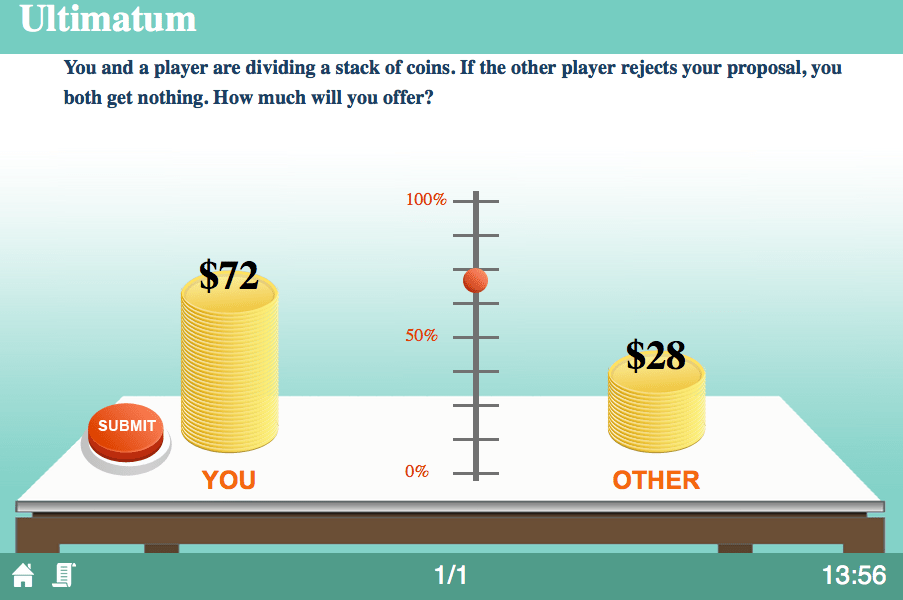
In this bargaining game, players are placed in pairs: one player is the Proposer, the other the Responder. The Proposer offers a split from a pile of coins. If the Responder accepts the proposal, payoffs are determined by the accepted proposal. If the Responder rejects the proposal, both earn nothing. This may seem like a simple binary game at first, but it goes beyond that when the Ultimatum game’s chat function enabled. When the Allow Chat option is selected, players can engage in bargaining with each other allowing a wide range of possible results.
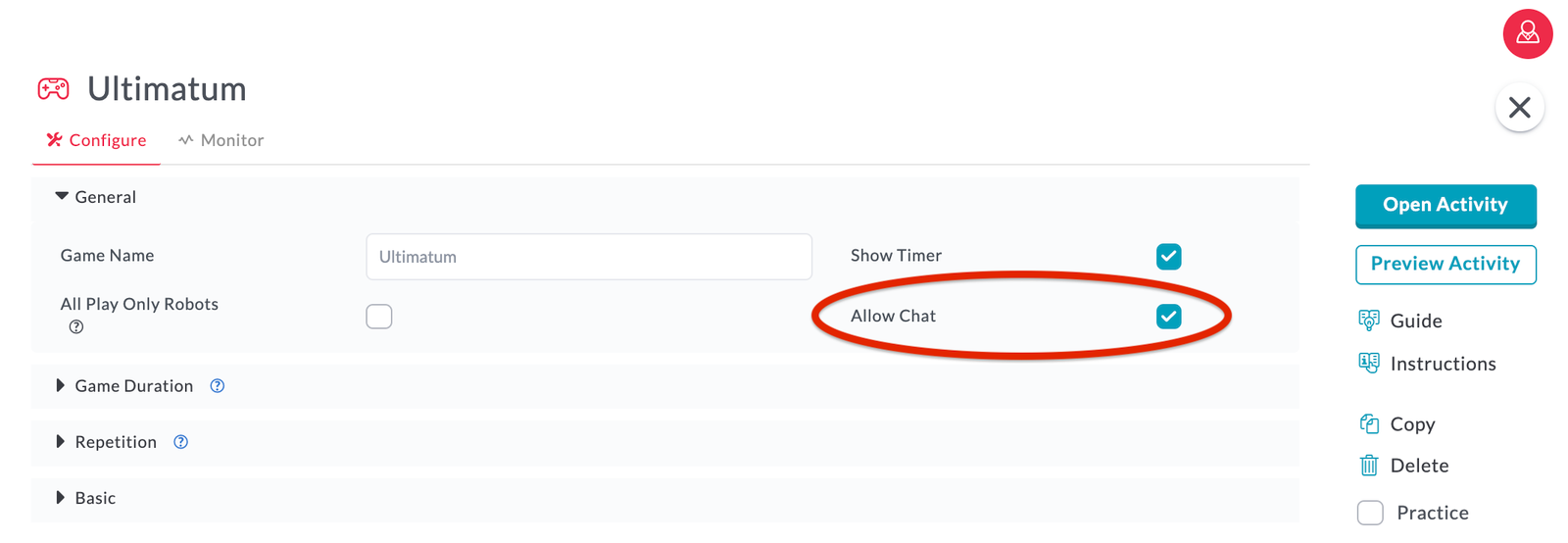
Game data and results are visually displayed to instructors after each game in the Results page. Instructors can choose to download and share these results with your class, allowing for exciting classroom discussions. Below are the aggregate results for all periods played.
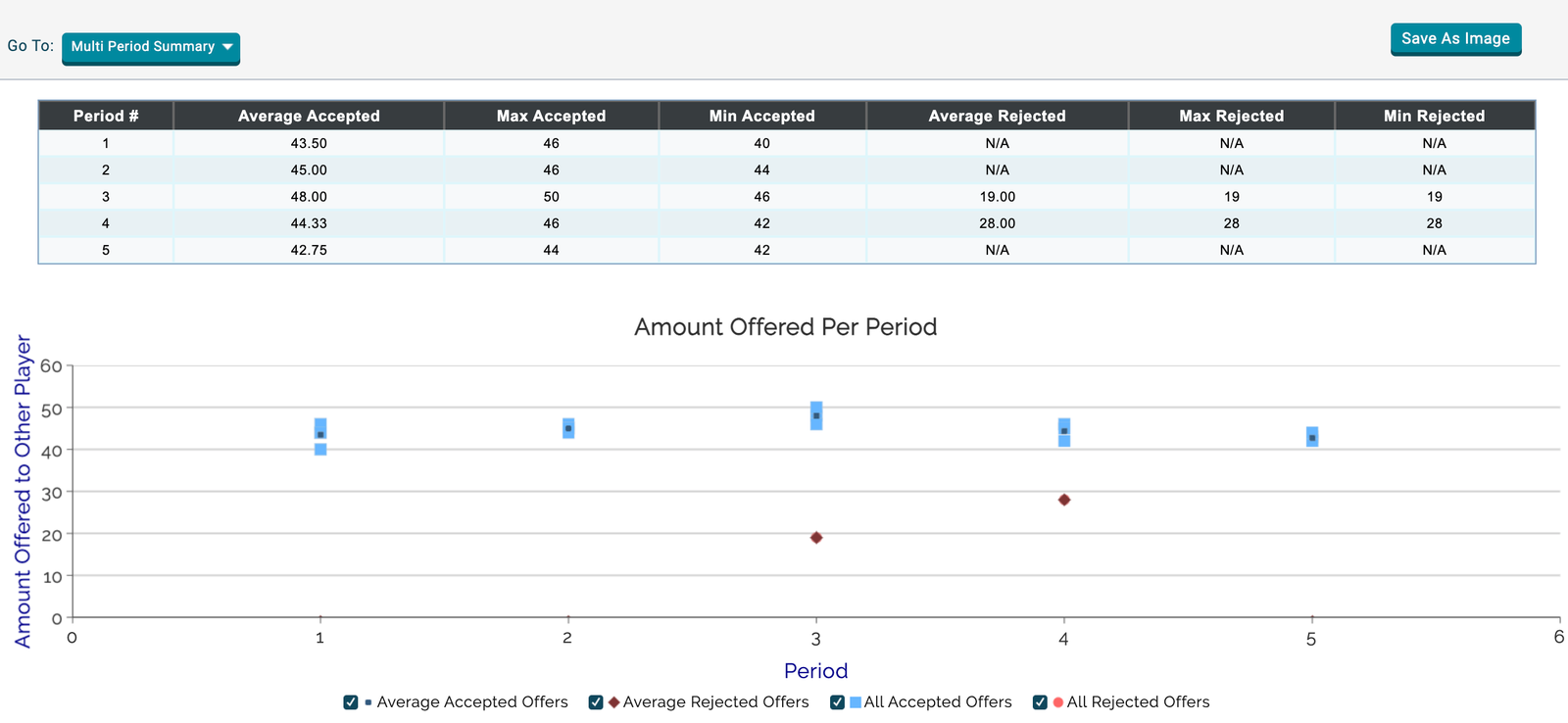
Game results can further be broken down by periods. To view, select the Multi Period Summary box at the top left. Note that in this particular game, there are five periods. The results below are displayed for Period 3.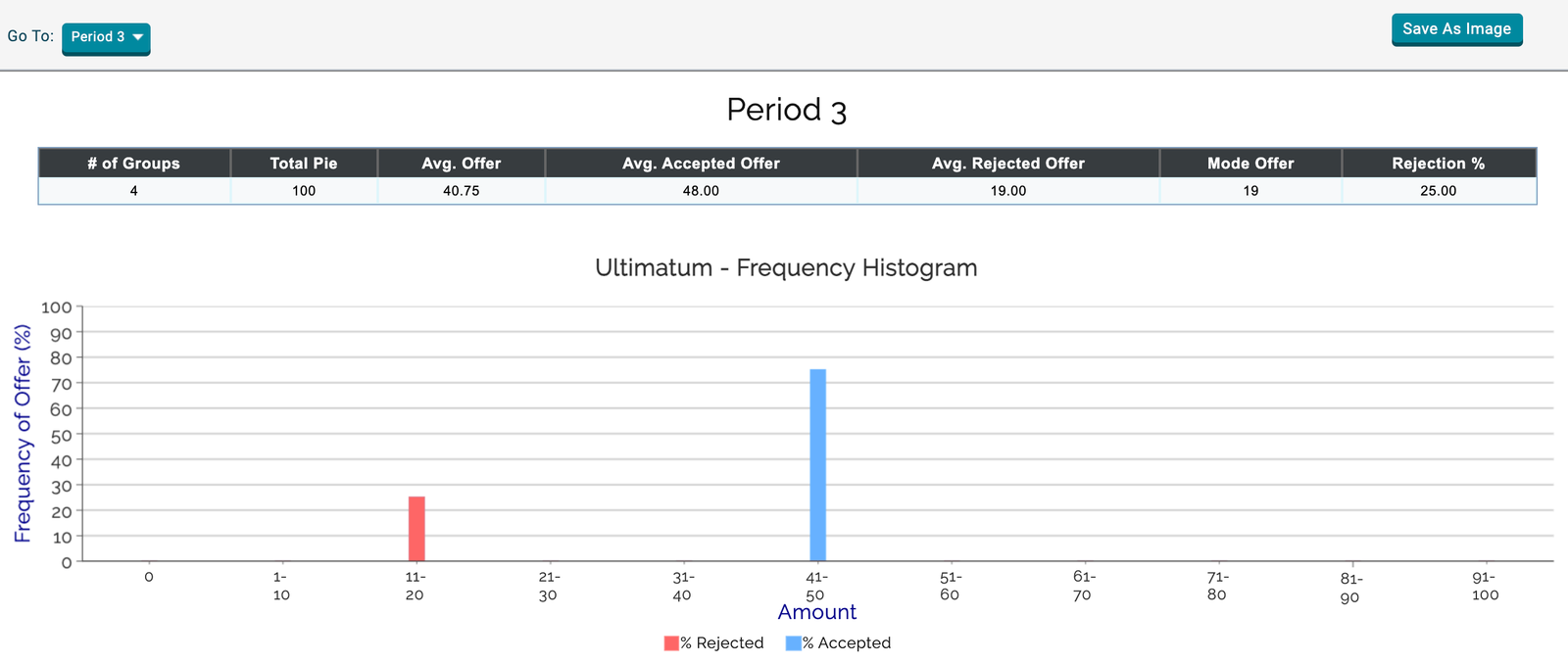
What about altruism and other social behaviors? Human behavior in the real-world is not just narrowly defined self-interest in the pursuit of optimality. MobLab’s Dictator game is a great way for students to display altruism, should they choose to do so. In this game, players are placed in pairs. One player (the dictator, called “the divider” in the instructions) chooses how to split a sum of money between herself and her match. The players then receive the payoff specified by the split. Think of the Dictator game like a more constrained version of the Ultimatum game where the power of decision making resides entirely with only one player instead of two.
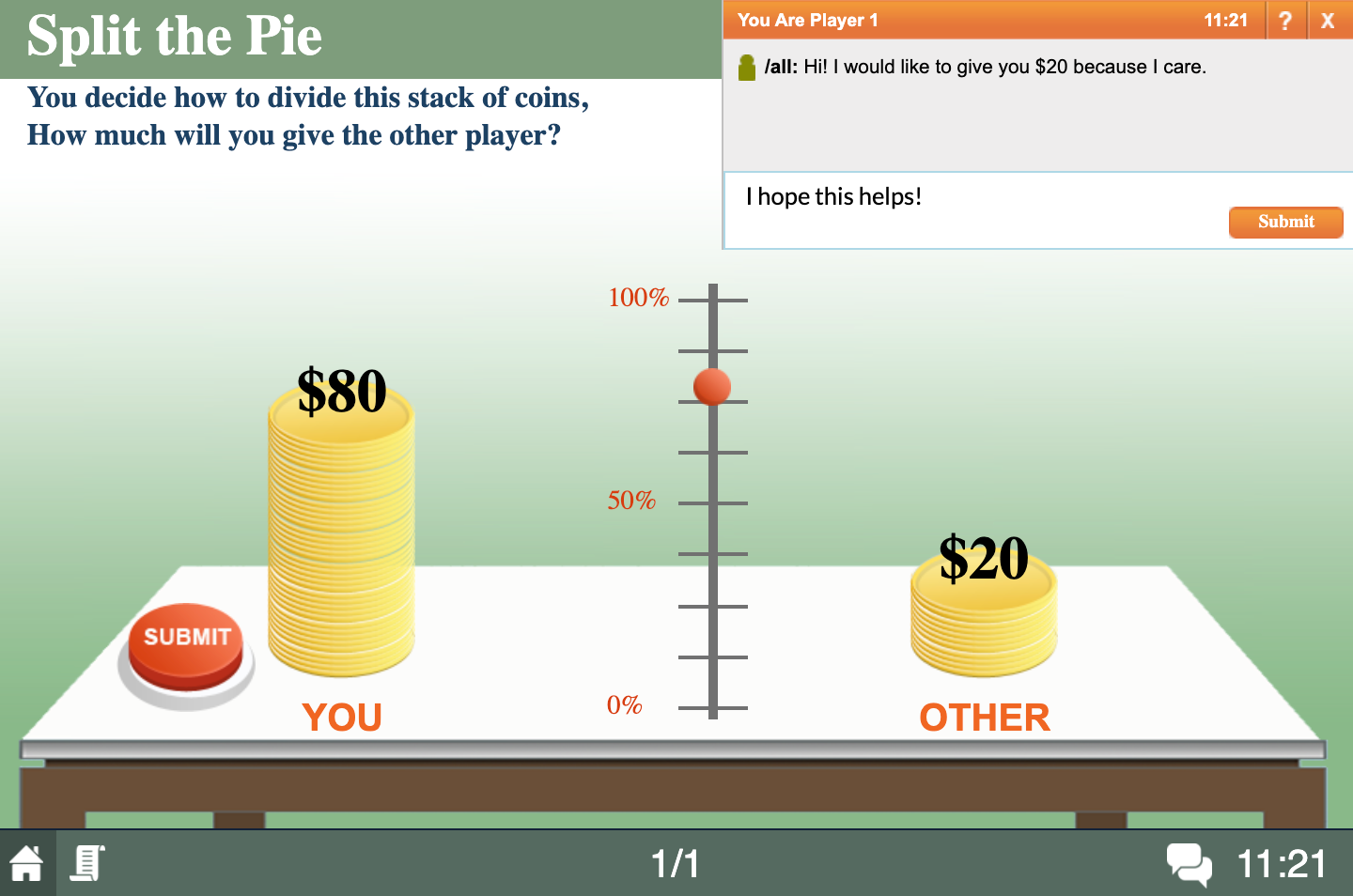
Any amount chosen to be split that is greater than zero (in this example, $20) demonstrates altruism.
Data and results in the Dictator game can be viewed just like in the Ultimatum Game.

We recommend a one-period game (Periods=1) for the Dictator game. Under the assumptions that a player gains utility only from her own payoff and monotonicity, the dictator will give nothing to the other player. While you will certainly have students who give nothing, it is not uncommon for a majority to give something, with many splitting the sum evenly. While giving more than zero is consistent with altruism or inequality aversion, there are alternative explanations. For example, choosing the greediest action may cause disutility, or a player might be concerned with what their peers or instructor thinks of her.
If you would like to collect the choices of all students, after finishing the one-period Dictator game, click Replay and then choose Rotate Role. Of course, the choices of the game-2 dictators will likely be affected by their experience from game-1.

Altruism, fairness, and self interest are all cards in life’s deck of choices. How we play those cards in that deck shapes decisions and consequences in the world we live in. Try our Ultimatum and Dictator bargaining games with your students to bring excitement and learn about the choices they will make!
Want to learn more about MobLab? Get in touch with our team! We are eager to set up our economics games for your class!

In this bargaining game, players are placed in pairs: one player is the Proposer, the other the Responder. The Proposer offers a split from a pile of coins. If the Responder accepts the proposal, payoffs are determined by the accepted proposal. If the Responder rejects the proposal, both earn nothing. This may seem like a simple binary game at first, but it goes beyond that when the Ultimatum game’s chat function enabled. When the Allow Chat option is selected, players can engage in bargaining with each other allowing a wide range of possible results.

Game data and results are visually displayed to instructors after each game in the Results page. Instructors can choose to download and share these results with your class, allowing for exciting classroom discussions. Below are the aggregate results for all periods played.

Game results can further be broken down by periods. To view, select the Multi Period Summary box at the top left. Note that in this particular game, there are five periods. The results below are displayed for Period 3.

What about altruism and other social behaviors? Human behavior in the real-world is not just narrowly defined self-interest in the pursuit of optimality. MobLab’s Dictator game is a great way for students to display altruism, should they choose to do so. In this game, players are placed in pairs. One player (the dictator, called “the divider” in the instructions) chooses how to split a sum of money between herself and her match. The players then receive the payoff specified by the split. Think of the Dictator game like a more constrained version of the Ultimatum game where the power of decision making resides entirely with only one player instead of two.

MobLab’s chat function allows players to exhibit altruistic and other various social behaviors.
Any amount chosen to be split that is greater than zero (in this example, $20) demonstrates altruism.
Data and results in the Dictator game can be viewed just like in the Ultimatum Game.

We recommend a one-period game (Periods=1) for the Dictator game. Under the assumptions that a player gains utility only from her own payoff and monotonicity, the dictator will give nothing to the other player. While you will certainly have students who give nothing, it is not uncommon for a majority to give something, with many splitting the sum evenly. While giving more than zero is consistent with altruism or inequality aversion, there are alternative explanations. For example, choosing the greediest action may cause disutility, or a player might be concerned with what their peers or instructor thinks of her.
If you would like to collect the choices of all students, after finishing the one-period Dictator game, click Replay and then choose Rotate Role. Of course, the choices of the game-2 dictators will likely be affected by their experience from game-1.

How to collect the choices of all students in the Dictator game = Repeat + Rotate Role
Altruism, fairness, and self interest are all cards in life’s deck of choices. How we play those cards in that deck shapes decisions and consequences in the world we live in. Try our Ultimatum and Dictator bargaining games with your students to bring excitement and learn about the choices they will make!
Want to learn more about MobLab? Get in touch with our team! We are eager to set up our economics games for your class!

